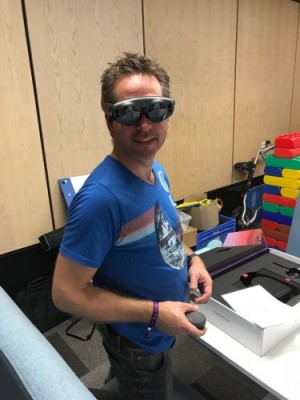Unique glasses reach Eindhoven
How did FHICT get this innovative device? “Until now, manufacturer Magic Leap only supplies them to developers in five American cities. But thanks to good contacts of our college in the United States, we managed to obtain some. Nice for us and for our students.”
Not ready yet
Unlike, for instance, Google Glass, the Magic Leap provides a very lifelike adaptation of the space around you. “The glasses recognise reality. You therefore immediately get a 3D representation of your own office or kitchen. The virtual additions you make are better than with the other glasses.”
The realistic representation is formed because the technique used does not place objects ‘flat’ on a screen, but is capable of projecting images directly on the eye, which makes everything more ‘real’.
The expectations of the glasses ‒ which seamlessly combines augmented and virtual reality ‒ have been high among insiders for quite some time. “Magic Leap announced the arrival of this device six years ago. In the meantime, it is clear that the current version is not (yet) ready for the consumer market.”
The Magic Leap is not expected to be in the shops in another two or three years. According to Ruissen, the current version already gives a good impression of in which area this technology is heading.
Realistic
How will FHICT use these glasses in education? “Yesterday it was passed around in the kickoff with the second-year students. It’s nice that they immediately experience the innovative and stimulating nature of it, and see what these glasses add to, for instance, standard virtual reality glasses.”
Ruissen thinks that the Magic Leap will soon open a variety of new perspectives in areas like architecture and set building. “It gives a very realistic image of what a completed building or object will look like. We can thus offer an optimum 3D experience soon, especially if we link our three sets.”

Author: Frank van den Nieuwenhuijzen
Source: bron.fontys.nl